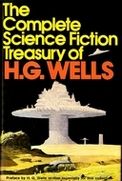I read this novel (or novella) as part of The Complete Science Fiction Treasury of H.G. Wells omnibus, which is the book reflected in the sidebar information.
The Time Machine is one of those classics that nearly everyone has been exposed to in some way. There are several movie adaptations, numerous critical analyses, references in many other books, and even a few sequels, official and otherwise. I've read or watched a lot of that material, but somehow never read the original story. I thought it was time to change that before reading Stephen Baxter's The Time Ships so that I'd be familiar with the base material.
The basic outlines of the story are probably familiar to everyone. In a regular gathering of gentleman, their host and one of their number, never named, discloses that he has invented a time machine and demonstrates a small model. They are invited back later to hear the results of his experiments, but their host is not there to greet them when they arrive. After some speculation and the beginning of dinner, the time traveler arrives late, dishevelled and injured, and recounts to them an amazing story of his adventures in the year 802,701.
Much of the story is therefore told from the first-person perspective of the time traveler. That segment is a classic adventure story, but mixed with observational detail and attention to the specifics of his surroundings that marks the story as science fiction (although it predates the development of that term). While there are several dramatic moments and close escapes, the focus of the story is on exploration, discovery, and the attempt by the time traveler to understand the history and nature of the far-future world in which he finds himself. In that sense, it surprised me with the similarity to a modern Big Dumb Object story, where the characters are put into an alien environment and are trying to determine how it works and why it exists from experimentation and clues.
The core of the discovery, of course, are the Eloi and the Morlocks, their history and relationships, and the implications for the future of the human race. I won't spoil the conclusions for those who have somehow avoided learning the details, but The Time Machine strongly reflects the sense of class consciousness, industrial relations, political debates, and class conflicts in the time when Wells wrote. Relationships between workers and management have changed since, largely removing the nobility from the picture, and so Wells's vision of the future feels slightly dated. However, it held up better than I expected. It was also more horrific than I expected. Wells develops quite a bit of tension from a shortage of matches and a sense of oppressive darkness, and despite the exploration and theorizing about the nature of the future world, he maintains a fast story-telling pace.
This is not an uplifting or optimistic story, and there is where it seems most different from the typical science fiction exploration of similar ideas. The picture of the future of both the world and the human race is pessimistic and bleak. Wells uses an artful and effective way of handling the normal problem of knowing that a first-person narrator must have survived by constructing The Time Machine as nested stories and using two narrators, permitting a dark ending at the character level as well. And yet, the story avoids falling into the horror trap of "things man was not meant to know." It left me not entirely sure how to react, with more of an ambiguous edge than the triumphant gentleman's story of harrowing adventure that it's modelled after.
If you've avoided the original because of concerns that it might be a slow and wordy classic or feel badly dated, it's still worth a look. The Time Machine does speak to a somewhat dated set of political concerns, and there's a lot of description and a plot that no longer carries many surprises, but it's worth reading. The description is concise, effective, and at times almost poetic; I was particularly delighted by the description of the ruins of the museum. If you've never read the original, it's worth checking out from the library or finding in one of the many inexpensive paperback edition.
Reviewed: 2009-11-01
